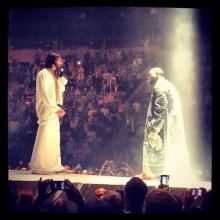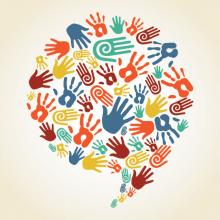common
On the opening night of the Yeezus Tour, multi-platinum, Grammy award-winning rapper Kanye West brought out an actor to portray Jesus during his concert in Seattle. Most of the time when I see "White Jesus" depicted, I don't get offended because I don't find it to be historically accurate. But between this and the title and theme of Kanye's last album, Yeezus, I was initially fed up. His antics were disrespectful, offensive, and just plain unnecessary.
Before I began to write this post I searched for concert footage of the event, but I stumbled upon an interview Kanye had with Wild 94, a hit music station in San Francisco. During the interview, which was done a few days after his Seattle performance, he was given the opportunity to explain his motives behind bringing out Jesus.
"We do plays all the time. People play Jesus,” West said. “You know what’s awesome about Christianity is we’re allowed to portray God. It’s a painting, it’s a sculpture, it’s a moving opera, it’s a play, it’s a message. God knows where my heart is at.”
Then came the comment that changed the entire direction of this post:
“One of the things that I really wanted to get across is that you can have a relationship with Jesus. That you can talk to Jesus. This is the way I express it.”
I recently went back to the Lincoln Memorial to tell the story of how and why I wrote my new book, On God’s Side: What Religion Forgets and Politics Hasn’t Learned About Serving the Common Good. And I reflected on my favorite Lincoln quote, displayed on the book’s cover:
“My concern is not whether God is on our side: my greatest concern is to be on God’s side.”
I invite you to watch this short video, and to engage in the discussion as we move forward toward our common good. Blessings.
Whenever I hear the term Common Good I think of Thomas Paine’s infamous pamphlet Common Sense,which challenged the British government and the royal monarchy, but did not challenge the institution of slavery. As an African-American woman I enter the Common Good conversation cautiously because I know that in our society we have a habit of taking what is good for Western hegemony and making it the standard for everyone else.
As we pursue the Common Good, let us remember what was once considered common and good during earlier points in American history: chattel slavery, indigenous genocide, and institutionalized sexism. To truly come to a Common Good, we need to honor a diversity of voices and challenge our assumptions about what is common and what is good. Our default is to take what is good for our culture, gender, or community and make it the common standard for all. I have experienced being invited into organizations that were aiming to do good in the world, but an expectation existed that I would be silent about my unique concerns as an African woman. I know that denying my reality can never be good for my spiritual, physical, or social well being.


